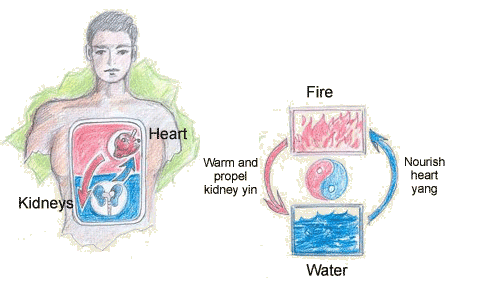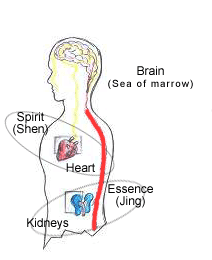III. The kidneys' relationship with the heart
 According to the five elements theory, the heart belongs to fire and the kidneys belong to water. They are categorized as possessing yang and yin properties respectively. The heart and the kidneys are closely related, with a mutually dependent and restrictive correlation within each other. If this functional relationship is abnormal, that is to say, if a dynamic equilibrium is disrupted between the body's yin and yang or water and fire properties, the morbid condition is termed as "non-coordination between the heart and the kidney". According to the five elements theory, the heart belongs to fire and the kidneys belong to water. They are categorized as possessing yang and yin properties respectively. The heart and the kidneys are closely related, with a mutually dependent and restrictive correlation within each other. If this functional relationship is abnormal, that is to say, if a dynamic equilibrium is disrupted between the body's yin and yang or water and fire properties, the morbid condition is termed as "non-coordination between the heart and the kidney".
The following concrete presentations describe their relationship:
1. Water and fire coordinate with each other mutually.
From a TCM viewpoint, the heart is located in the upper part of the body. It is categorized as yang and presides over water, which has a quiet property. While the kidneys are situated in the lower part of the body, they are categorized as yin and preside over fire, which has a dynamic property. Under normal physiological conditions, the heart fire descends to the kidney and joins with the kidney-yang to warm and propel kidney-yin. On the other hand, kidney water ascends together with heart-yin to nourish heart-yang and prevent it from becoming hyperactive. There are Chinese medicine sayings such as "when the kidneys lack heart fire, then water is cold; when the heart lacks kidney water, its fire becomes hyperactive." When water and fire are in harmony, a relative balance between the yang above and the yin below is maintained ensuring a healthly condition.
 |
| Coordination between the heart and the kidneys is necessary for each organ to work properly. |
Once there is disruption between heart fire and kidney water with yin ascending and yang descending, pathological conditions will occur. For example, when kidney yin is exhausted, the kidney water fails to restrict the heart fire and leads to a hyperactive heart fire. Meanwhile, the hyperactive heart fire cannot be directed downwards to warm the kidney water. Therefore, the upper part of body is suffering from hyperactive heart fire, whereas the lower part of body is suffering from coldness and coagulation of kidney water, leading to problems like insomnia, night involuntary semen emissions and in severe cases, mental confusion such as delirium.
2. Essence and blood transform each other mutually.
The physiological function of the heart is to govern the blood, and the physiological function of the kidney is to store essence. Blood and essence are important elements inside the body; they form the essential substances in maintaining life activities. The kidney essence can transform into blood, and the blood can transform into essence. The mutually transforming and breeding actions provide the material basis for the functional correlations of the heart and the kidney.
3. Essence (jing) and spirit (shen) employ each other mutually
 |
| Accumulating essence can make the spirit full and complete, which ensures emotion and / or sentiment. |
According to TCM, the heart houses the spirit (shen). It dominates all life activities and replenishes the essence. The kidneys store the essence (jing), which transforms into bone marrow and the sea of marrow. The marrow gathers and fills up the brain. That is why TCM believes essence also shelters emotions or sentiments. Accumulating essence can make the spirit full and complete so that it can be on guard internally. Our spirit, which defines our individuality, is the manifestation of essence. That is to say, our mental activities are not only controlled by the heart, but also are influenced by the kidneys intensively. A well-established close relationship between the kidneys and the heart ensures that the kidney essence (categorized as yin) ascends and consoles the heart's spirit. In contrast, it also ensures that the heart qi (categorized as yang) descends and consoles the kidneys' emotions. There are Chinese sayings such as: "essence is the material basis of the spirit; spirit is the outer manifestation of essence." Spirit arises from essence and will power arises from the heart. These activities are also influenced by interactions between the heart and the kidney. When there is a yin deficiency in the lower part of body and yang hyperactivity in the upper part of body, the heart cannot contain the spirit and essence fails to house our emotions. Under these conditions, diseases such as mania, depression and dementia can occur.
|